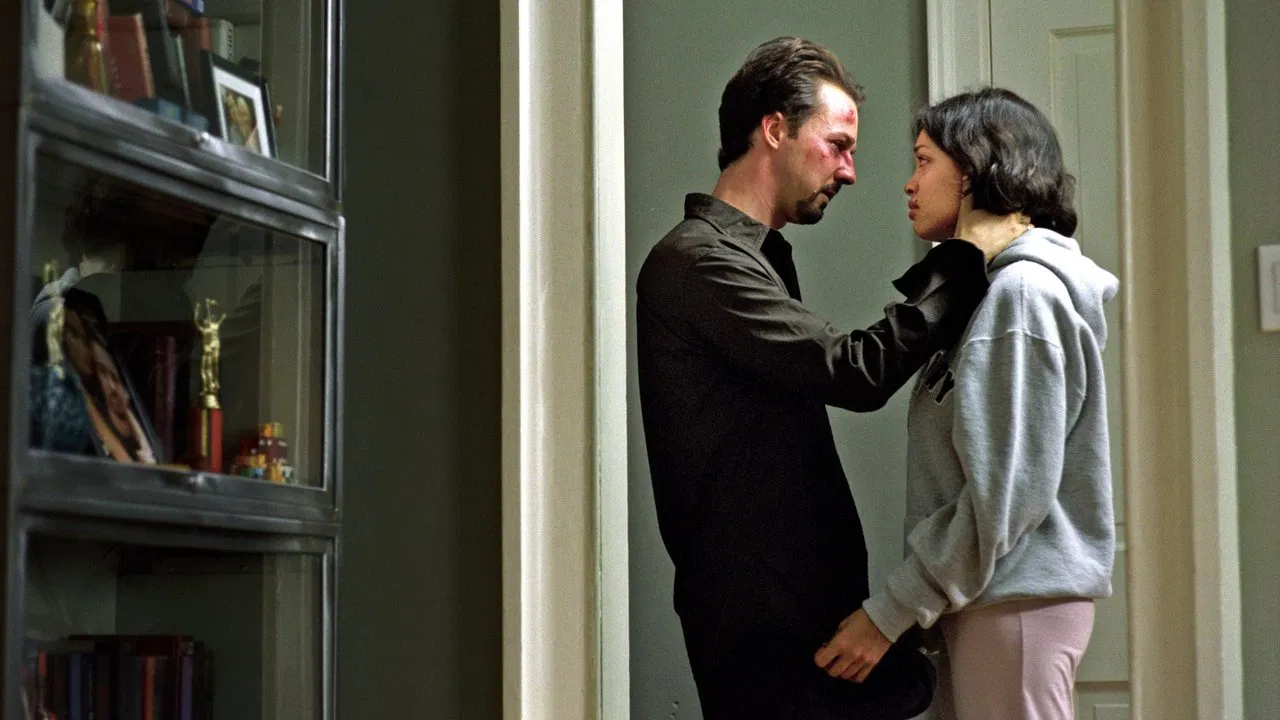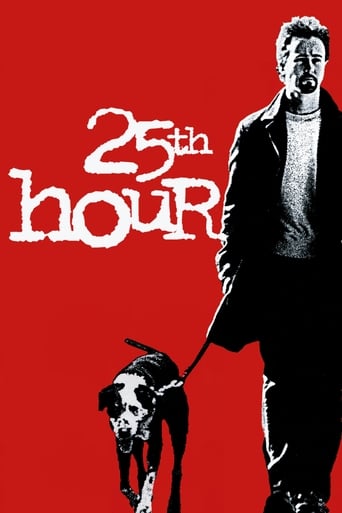

Very well executed
... View MoreGood start, but then it gets ruined
... View MoreI wanted to like it more than I actually did... But much of the humor totally escaped me and I walked out only mildly impressed.
... View MoreWhile it doesn't offer any answers, it both thrills and makes you think.
... View MoreThe first movie of my life that I didn't end it cause it was horrible and very very boring with stupid dialogues
... View More25th Hour would leave a lasting impression on you if only because of Brian Cox's monologue as he imagines a new life for his son. It gives you hope, albeit not without a bit of doubt and breaks your heart just when you start believing that it might just be how the movie ends, with Monty on the run from the law. The powerful performances, the dark and effective score and the melodramatic cinematography all fit the themes of the story (written by the author of the book the movie is based on) to make this film emotionally challenging. 25th hour is one of the best movies to come out during the first decade of the 21st century; a must watch
... View MoreMonty Brogan comes across an injured dog in the opening scene. First he wants to put it out of its misery, but upon its fierce growls, he resolves to nurse Doyle back to health. Fast forward to his last 24 hours of freedom, and Doyle is there. This is a starkly depressing portrait of New York City painted by Spike Lee. The opening credits feature twin spotlights in place of the World Trade Towers, and the great city is dark, muted, grieving in the wake of 9/11. Prieto opens with a grainy look. Jacob and Frank talk over the ashes of Ground Zero and the tragedy that shoot America, but he would never sell such a prestigious spot in the skyline. The muted palette is punctuated by a few instances of vivid colour. The most memorable is the monologue in the bathroom, where Norton's passionate and bitter voice-over serenades a highly saturated daydream of New York and its various inhabitants and creatures. The sky is literally pure white, such is the intensity of the colour grading. It's a great contrast to the sheer hostility in Monty's rant. The outrageous flood of emotions in the wake of his mistake and the city, in all its glory and gore signify not only how he wishes he had quit earlier, but the harsh reality that this is all his own doing as his mirror self unleashes. The first two stages of grief are denial and anger; Norton fully showcases both here.His two best friends mirror his dilemma in their own lives. Frank is a cocky wall street broker, who like Monty, has indulged in a lavish lifestyle by profiting on the misery of others. He is so sure that Monty's life is over as he repeatedly tells Jacob; but then later in the silence of the club, he makes a heartfelt promise to be there after 7 years. They leave on heartbreaking terms; the 'fight' scene is visceral like no other, so much more emotional punch (both literally and figuratively) and conflict because we know how much Frank loves Monty and yet how angry those blows feel - how long has he wanted to beat some sense into his best friend? Jacob's issue is his attraction to one of his students, but Benioff's twist is that both seem to understand why they cannot go any further. Two of Lee's trademark double dolly shots appear here. One, of Paquin in her ecstasy driven state of pure euphoria, slowed down to magnify the drug's effects. The second, right after that momentary kiss; Jacob stares at the camera in confusion and distress as he glides along, the club raging on without him. There is a sobering effect as he realises what he has done; one little whisper like Kostya and his comfortable life will crumble. Both Hoffman and Pepper excel at these supporting roles, and credit must also be given to Benioff for creating such an engaging trio who seem to be utterly and distinctly different from each other. How many movies would group together a pompous wall streeter, a modest English teacher and a drug dealer together? But they display such depth, and so we fully believe that Frank will not break his promise, but also feel the shocking need for each blow which distorts Monty's face. Dawson as Naturelle is seductive, and yet disproportionately shallow. Their little youthful encounter (Ebert would call it a meet cute) by the swings does not hold the same unspoken bond that Monty has with Jacob and Frank. This is a messy movie. Car trunks are slammed shut, and then again. We jump cut in the middle of dialogue subtly, and the 180 degree rule is violated when the trio fight under the bridge. On the other hand, we have that final segment where Monty's father envisages an alternative escape for his son. It has a certain sentimental charm to it, and almost verges on cliché; Monty and Naturelle reunite and come together three times in succession, and grow old and tell their story (Blanchard's score is its most stirring here). But Cox makes it heart-wrenchingly evocative in his monologue; he talks of an idyllic future that Monty will never experience, and he is powerless to change this. An old saying states that no parents should ever have to bury their children. Here, no child should have to support their father's bar with drug money, and we feel James' guilt in his every word, and it is tragic.
... View MoreThink of the innumerable bad guys that James Bond has ruthlessly dispatched over the years. Not the megalomaniacal villains of infinite ego, just the faceless and nameless body-bags that are just mild plot inconvenience. These people are such an unquestionable part of the world and they're a cog in the machine that keeps the plot moving, but we don't really think about this because these films don't invite us to think deeply about them, about how they became involved in these ridiculous plots, about whether they have a family or if they're struggling with the guilt of what they've left behind to pursue this life. Clerks thought about this over two decades ago, in relation to Star Wars. 25th Hour gives its narrative to one of these people; Monty Brogan is one of these elementary parts that helps sustain an entire operation, something that is taken for granted. He's a drug dealer, and of course there's nothing noble or commendable about that, but rather than being solely defined by that title, he's just another guy. So Monty Brogan is going to prison. Although this is an unalterable conclusion, he still exists in a kind of transitory state, 24 hours of purgatory, between the closing of his old life and the beginning of a new one, in which judgements can still be cast and relationships re- defined. Edward Norton always verges between 'everyman' and slick self-possessed star, and here he does kind of exist between those two states. As he goes about these final hours trying to ensure some sort of stability, we see both a man who's got that typical wit and verbosity of a protagonist who can always summon the correct words, a man seems to balance the immorality of the job from which he thrives with small moments of compassion, like his saving a dog in the opening scene or giving bills of cash to a sleeping tramp, but also the selfish dick who hasn't quite balanced the good deeds with the bad. There's sometimes a little of his character from Fight Club, except here it's not his masculinity that's in question, his impotence arises from the realisation that he might have wasted his life.And that feeling of uncertainty and things being questioned exists throughout, both in camera and subject. The cinematography is often kind restless, jumping from this position to the next, giving energy to environment that doesn't seem to have any. When Philip Seymour Hoffman is in English class with his students, there's a feeling of listlessness offset by this cinematography, and then later when scantily-clad student Anna Paquin challenges him about her B grade, in her disarming approach of both flirtation and contempt, the erratic camera almost turns this into some sort of intoxicated sit-com. There's also this occasional editorial choice that happened twice early on in the film in close succession and then (as far as I could tell) not again until the end, in which a certain action is shown twice, from a different angle. This happens as Norton and Hoffman move to embrace each other, and it's almost as if the film is stuttering and re-adjusting itself. In these weird moments the temporality of events is being affected, because I thought maybe these were supposed to be small but defining moments in his life, but maybe the reason is indiscernible.But what's clear is the film's immediate reaction to 9/11. The book was written before this happened, but just the very nature of it being incorporated into the film surprised me, not because it's a deliberately provocative move but because in the wake of such unfathomable tragedy people would choose to interpret it that way. But this isn't some fantasy land in which all real-world contexts can be ignored. They were edited out of Spider Man, but to do that here would be ignoring something very important about New York, and by extension America, and that's really what this film is. There's a moment in which Barry Pepper and Philip Seymour Hoffman are standing before Pepper's apartment windows, with a full view of the devastation of ground zero. The camera never moves throughout the entire discussion, in stark contrast to what I previously described, and so what you get is an evocative mixture of character and real world consequence. Monty Brogan isn't even present, the topic of discussion, and the script changes perspectives really subtly throughout the entire film, because it's aware that we can learn about our protagonist effectively through other people, and vice versa, but also that the characters can represent something larger than themselves. Barry Pepper is the slick semi-yuppie, voice of masculinity, Philip Seymour Hoffman, ever reliable, ever wonderfully uncool, is emasculated and anxious and never quite comfortable anywhere, his character described as someone who ran away from his privilege and Edward Norton lies somewhere in between, a man with money and composure but lots of things tearing at him underneath. During his now famous vitriolic monologue in a bathroom mirror, he sees the words 'fuck you' written on its corner and in retaliation releases and explosive condemnation on every culture and ethnicity present in New York, all reservation Norton had kept at this point gone as the melody of his words almost become a poetic performance piece, something which is echoed in the final monologue delivered by the father, Brian Cox. But here, as we cutaway to portraits of the people being described in borderline-racist terms, we're not seeing a character display a sweeping racism or misanthropy for everyone, but a man deflecting his own insecurities and defeats onto every other person available. It's America as both the large multi-cultural nation still thriving in its diversity, and America as a single man who is trying not to lose everything because he might have fuckedup the idea of the American Dream.
... View More